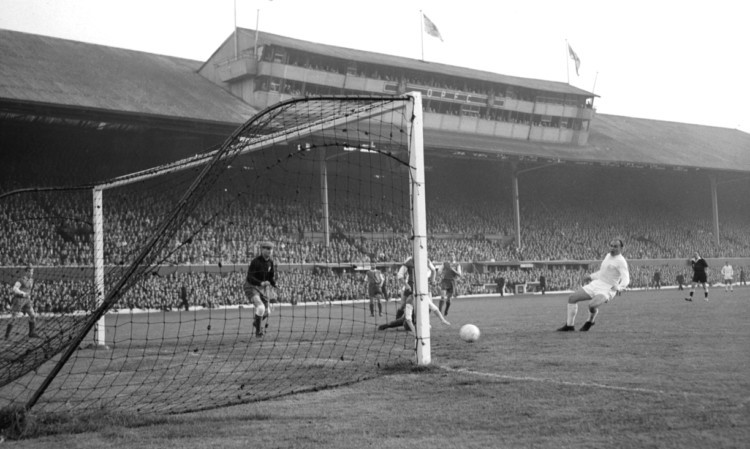
Alfredo Di Stefano was rightly lauded for the enormous part he played in gaining universal recognition for the European Cup, now the Champions League.
Real Madrid won the first five Finals with Di Stefano scoring in every one, including his legendary hat-trick at Hampden in 1960 against Eintracht Frankfurt in a 7-3 win.
Yet incredibly the ‘Saeta Rubia’ ‘blond arrow’, never got beyond the European stage.
Tributes to Di Stefano, who died last Monday aged 88, all emphasised he was the greatest player never to play in the World Cup Finals.
And that was mainly down to a wee striker from Dundee, Jackie Mudie. When Spain drew Scotland and Switzerland in the qualifiers for the 1958 Finals in Sweden, they were immediately installed as favourites.
On Di Stefano’s first appearance at Hampden, however, the Scots shocked Europe by beating Spain 4-2.
Blackpool striker Mudie only stood 5’ 6’’ tall yet he ended up head and shoulders above his illustrious opponents. He scored three times in a sensational victory that was enough to send Scotland to Sweden and keep Spain in Spain.
Mudie was a typical unassuming Scot, having joined Blackpool from Dundee amateur side Dunkeld just after the war. He played in the famous 1953 FA Cup Final, forever known as the ‘Matthews Final’.
Blackpool recovered from 3-1 down to beat Bolton 4-3. Although Stan Mortensen scored a hat-trick aided by Matthews’ magic, Mudie was the unsung hero. Meanwhile Di Stefano put the disappointment of his first visit to Glasgow behind him.
Apart from the 1960 European Cup Final, the Spaniard also played at Ibrox three years later against Rangers in a European Cup tie which Real won 7-0 on aggregate.
The following year Celtic made an audacious bid to bring Di Stefano, by now 36 and recently released by Real, to Glasgow full-time.
Manager Jimmy McGrory flew to Madrid with an offer of £200 per game, when the highest wage in Britain was the £100 per week England captain Johnny Haynes was paid at Fulham it failed to interest Di Stefano who had agreed a deal with Espanyol.
By then the great man had achieved almost everything apart from gracing the World Cup Finals. For that. Jackie Mudie deserves to be remembered, too!

Enjoy the convenience of having The Sunday Post delivered as a digital ePaper straight to your smartphone, tablet or computer.
Subscribe for only £5.49 a month and enjoy all the benefits of the printed paper as a digital replica.
Subscribe